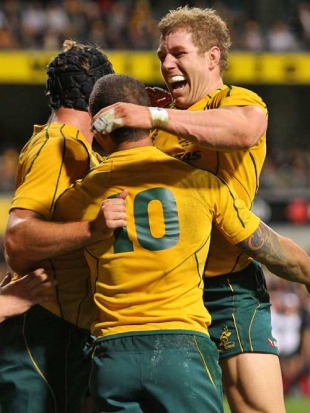|
Comment
Wallabies hold the ace in Cooper
Keiran Smith
June 14, 2010

Quade Cooper is congratulated by David Pocock after scoring on of his two tries
© Getty Images
Enlarge
Last Saturday's Test against the old enemy in Perth had a very familiar feel. Like Twickenham in 2005 and Marseille in 2007 the Wallabies' front-row collapsed under an English avalanche. Unlike those two seminal, and career-ending, moments for the respective coaches, on this occasion the Wallabies had a backline that delivered on its potential and were at times spectacular in their execution. However, only so much can be read into this latest instalment of English scrum dominance, not least because the Wallabies fielded a front row with only two Test caps between them, plus the uncapped reserve James Slipper. It is doubtful whether the, currently unavailable, first choice combination of Ben Alexander, Stephen Moore and Benn Robinson would yield as easily as the debutants on show last weekend. With James Horwill and Wycliff Palu also to return, the pack will have a very different feel by July. Although, Robbie Deans will not be breaking the glass over the red emergency button and recalling the experience of Matt Dunning and Al Baxter just yet. Instead he will see this as a harsh learning curve and a test to see how these players respond to the challenge at hand. Mind you, it doesn't get much tougher than playing against a front-row bred on historic feats at scrum time. As Australians, we'll never get the English fascination with this setpiece but we do need to find a counter measure as nine scrum penalties, including two penalty tries, is hardly the form any Australian pack can take into the crunch games to come. While the Aussie forwards were being mauled, fortunately, the England defence resembled the Swiss variety of cheese as the likes of Quade Cooper, James O'Connor and Drew Mitchell scooted through gaping holes all night long. Had the backline's handling been more assured early in the match, the Wallabies would have had the game safely tucked up in their swag well before half time. This is one area they need to improve and Deans could do worse than play his team the video of New Zealand's demolition of Ireland on the same night as a pertinent demonstration in finishing. Cooper's impact, in particular, grows in each match and barring misfortune hehas to be our pivot throughout the Tri-Nations. His ability to not only read a pass but then deliver it has not been seen since Stephan Larkham and the entire backline looks more confident because of it. The English struggled to cope with his running at the line and his two tries show he knows how to get to the line. England coach Martin Johnson will need to find a better defensive strategy to limit Cooper's impact this week in Sydney. Balancing the guile of Cooper, Mitchell and O'Connor, are Digby Ioane and Rob Horne who give the outside attack its shock factor with their hard and direct running. In Horne a long term replacement for Stirling Mortlock may have been found. Scrum-half Luke Burgess had his best game in Wallabies colours and while it won't be enough to displace incumbent Will Genia, it will settle his nerves and rebuild confidence which disappeared last season. His snipes from the base of the ruck were reminiscent of the form that earned him his first Wallabies cap and with his quick service from the breakdown, an area where he has often labored, gave Cooper the impetus to destroy the brittle English midfield defence. It appears Robbie Deans has got the backline balance just right, but that leaves him with a not entirely uncomfortable quandary of choosing between Berrick Barnes and Giteau at No.12. In Barnes, Deans gets precision kicking, strong inside defence and the ability to break the line when running, whereas Giteau, not as powerful, is more likely to create try-scoring opportunities for the outside men and is the country's best goal-kicker. Another pleasing aspect of this victory is the Wallabies' defence, which refused to yield under sustained pressure, particularly in the second-half. Barnes and David Pocock stood out most in an evening where an ability just to survive and hang on proved every bit as critical as a fluid backline attack. As much as we would like to see the Wallabies regularly dominate and carve up the opposition out wide, there will be occasions where we need to 'win ugly'. The Springboks and All Blacks are experts at knowing how to win the tight matches and to win the Tri-Nations the Wallabies will need to learn quickly. © Scrum.com
|
Live Sports
Communication error please reload the page.
-
Football
-
Cricket
-
Rugby
-
- Days
- Hrs
- Mins
- Secs
F1 - Abu Dhabi GP
Abu Dhabi Grand Prix December 11-131. Max Verstappen ()
2. Valtteri Bottas (Mercedes)
3. Lewis Hamilton (Mercedes)
4. Alexander Albon ()
5. Lando Norris ()
6. Carlos Sainz Jr ()
-
ESPNOtherLive >>
Golf - Houston Open
Snooker - China Open
Tennis - Miami Open

